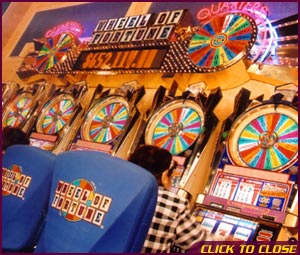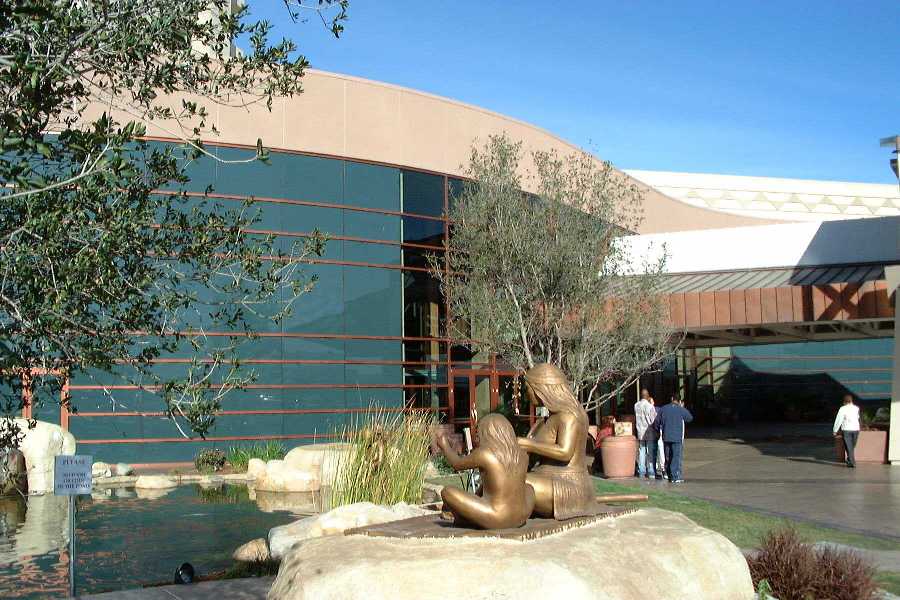 Another Stereotype of the Month entry:
Another Stereotype of the Month entry:
 Another Stereotype of the Month entry:
Another Stereotype of the Month entry:
JOSEPH PERKINS
THE SAN DIEGO UNION-TRIBUNE
Gaming tribes have gone too far
I was one of the nearly two-thirds of California residents who voted in March 2000 for Proposition 1A, a ballot measure that amended the state constitution, no less, to allow Las Vegas-style casino gambling on Indian reservations.
It's the worst vote I ever cast.
I was duped by California's gaming tribes, which spent a whopping $8 million of their blackjack and slot machine profits on particularly persuasive television commercials.
"Gaming has replaced welfare with work, despair with hope, and dependency with reliance," spake Mark Macarro, the pony-tailed chairman of the Pechanga band of Luiseno Indians, bedecked in blue jeans, blue work shirt and bola tie.
"If Prop. 1A is not passed," he fretted, "Indian casinos in California could be shut down, and the jobs and economic benefits they provide will be lost."
No one who empathized with America's most needful minority wanted that. Not when so many Native Americans continued to live under Third World conditions.
Not when a third of Indian families continued to subsist below the poverty line. When half were jobless on the reservation. When a third of Indian youngsters continued to drop out of high school. When a fifth of Indian families lived in homes lacking indoor toilets and telephones.
As it turns, California's gaming tribes were simply laying a guilt trip on the Golden State's pale skins and black skins and brown skins.
Sure, Macarro and his fellow tribal chairmen were interested in uplifting their poor and downtrodden brothers and sisters. But they were more interested in growing their gambling operations to Las Vegas-like proportions.
They didn't merely want to maintain their existing level of gaming – the thousands of card tables, the thousands of slot machines – the wanted to open new casinos, to exponentially increase the overall number of tables and slots throughout the state.
Indeed, in San Diego County, which already boasted three major casinos run by the Barona, Sycuan and Viejas tribes, a half dozen other tribes saw the passage of Prop 1a as a greenlight to jump into the casino game.
The ethnic preference the state's voters bestowed upon the tribes – allowing them to operate casinos, while continuing to forbid whites, blacks and browns from doing so – allowed them to recruit out-of-state investors that promised to put up most, if not all, the investment money.
Meanwhile, the state's richer Indian bands, those that already had gambling lucre flowing into tribal coffers, were so emboldened by their successful campaign for 1A that they decided to throw their new-found influence around in the state capital.
The gaming tribes have spent more than $120 million over the past five years to support their pet candidates and pet ballot initiatives, according to the state Fair Political Practices Commission.
"That's a staggering sum of money," commission chairwoman Karen Getman said last year, more than any other special interest in the state. "You have to remember," she added, "that every penny of it was intended to influence the outcome of an election, or some legislative proposal."
Indeed, almost every piece of Indian-related legislation that has come before lawmakers in Sacramento since passage of 1A would further subordinate the interests of the state's 36 million residents to the putative sovereignty of the state's tribes.
The most pernicious was a measure that would have required government agencies to notify tribes of any development projects proposed within five miles of a reservation. If a project threatened a supposed "sacred" site, a developer would have to seek mitigation acceptable to the tribe.
If "sacred" sites had become the law of the state, it would have given tribes effective veto power over land-use decisions in many California counties.
In fact, the measure's five-mile notice would have have applied to much of San Diego County, the nation's sixth most populous, which boasts some 18 Indian reservations.
The legislation did not pass this year, but the tribes hardly have given up on it. They'll grease as many palms in Sacramento as necessary to get the measure enacted next year.
That's why the tribes have spent so much on California's recall election, more than any otherspecial interest.
With more than $3 million in direct campaign contributions, they've bought and paid for Democrat lieutenant governor Cruz Bustamante, whom they hope to succeed Gray Davis, the incumbent Democrat governor.
Meanwhile, to undermine the candidacy of Republican Arnold Schwarzenegger, whom refuses to purchased by the tribes, the Morongo Band of Mission Indians is bankrolling television commercials for Republican Tom McClintock.
The tribes figure that by pumping up McClintock, who has little chance of actually being elected, they can split the Republican vote, ensuring Bustamante victory.
And McClintock, who portrays himself as a conservative man of principle, is only too happy to go along with with Morongo tribe's cynical political maneuver; to blithely accept their special interest largesse.
California's gaming tribes have made fools of those of us who supported Proposition 1A. Who never envisioned that the measure's passage would lead to a proliferation of casinos throughout the state. Who never imagined that the tribes gambling riches would corrupt the state's political process.
A hard lesson has been learned: No well-intentioned vote goes unpunished.
Copyright 2003 Union-Tribune Publishing Co.

Rob's reply
>> Sure, Macarro and his fellow tribal chairmen were interested in uplifting their poor and downtrodden brothers and sisters. But they were more interested in growing their gambling operations to Las Vegas-like proportions. <<
Even if true, where's the contradiction in these two statements? If small gambling operations uplifted poor and downtrodden Indians to a small degree, why wouldn't greater gambling operations uplift poor and downtrodden Indians to a greater degree? Perkins implies bigger casinos are somehow worse, but he doesn't supply any evidence of it.
>> They didn't merely want to maintain their existing level of gaming – the thousands of card tables, the thousands of slot machines – the wanted to open new casinos, to exponentially increase the overall number of tables and slots throughout the state. <<
Most tribal chairmen (and chairwomen) are upgrading their facilities or replacing them with new facilities. They aren't responsible for what other tribal leaders choose to do. For example, Chairman Macarro doesn't necessarily want other tribes to open casinos near the Pechanga Casino and Resort. He might be happier without the direct competition.
Perkins's use of the word "exponentially" shows an ignorance of basic mathematical concepts. I'd be surprised if the number of tables and slots has increased geometrically, much less exponentially. Perkins is using the scariest word he can imagine to exaggerate the "problem."
>> Indeed, in San Diego County, which already boasted three major casinos run by the Barona, Sycuan and Viejas tribes, a half dozen other tribes saw the passage of Prop 1a as a greenlight to jump into the casino game. <<
Who says California's voters didn't intend that? Especially since these San Diego tribes are building casinos on their own reservations. Isn't that exactly what voters intended when they passed Propositions 5 and 1A? If Perkins has evidnece to the contrary, let's see it. He sure hasn't presented it in this screed.
>> The ethnic preference the state's voters bestowed upon the tribes – allowing them to operate casinos, while continuing to forbid whites, blacks and browns from doing so – allowed them to recruit out-of-state investors that promised to put up most, if not all, the investment money. <<
That's a political preference, not an ethnic preference. Tribes whose members are less than one-half Indian by "blood" can still open casinos. Indians who aren't members of tribes can't open casinos even if they're "pure-blooded." The race of the participants doesn't matter; the political affiliation does.
Next, what's wrong with out-of-state investors? Does Perkins know the state of origin of every investment in a California project? If not, he should keep his mouth shut.
You see this insinuation all the time, and it's patently absurd. Why are out-of-state investors worse than in-state investors? Where's the evidence for assuming the worst? Nowhere, obviously.
This is either unconscious xenophobia (fear of "foreigners") on Perkins's part, or conscious scaremongering. Ooh, beware the big bad outsiders. Maybe they're from Las Vegas. Or worse, New Jersey! Maybe they're a front for the mob. Or worse, for Commies or terrorists! Or invading space aliens!!
Finally, note the key phrase above: "the state's voters." Clearly, Perkins doesn't like the results of a fair election. Well, boo hoo. Maybe he'd prefer to live in a dictatorship rather than in a democracy where the voters decide. He can love it, leave it, or change it, but his crybaby tactics aren't helping the situation.
>> The gaming tribes have spent more than $120 million over the past five years to support their pet candidates and pet ballot initiatives, according to the state Fair Political Practices Commission. <<
Tribes have mostly spent the money to support ballot initiatives, not candidates. And when the ballot initiatives receive overwhelming public approval, how are they "pet" initiatives? In short, Perkins's statement is misleading at best.
See Have Gaming Tribes Bought California for $120 Million? No for an analysis of this claim.
>> Indeed, almost every piece of Indian-related legislation that has come before lawmakers in Sacramento since passage of 1A would further subordinate the interests of the state's 36 million residents to the putative sovereignty of the state's tribes. <<
Who says the state's residents don't share the interests of gaming tribes? For instance, if gaming helps tribal members forgo state health and welfare services, doesn't that benefit all residents?
Even if Perkins's statement were true, isn't that how the system is supposed to work? We elect legislators to pass laws on our behalf. If Perkins doesn't like the decisions of the present legislators, he can campaign or vote for different ones. But he should stop whining when he disagrees with a democratic result.
Since the Legislature doesn't pass every law the Indians want, it's clear the system is working. Legislators weigh the merits of both sides and pass bills accordingly. The failure of the sacred sites legislation proves Indians are not the dominant force in Sacramento.
>> The most pernicious was a measure that would have required government agencies to notify tribes of any development projects proposed within five miles of a reservation. If a project threatened a supposed "sacred" site, a developer would have to seek mitigation acceptable to the tribe. <<
The sites are sacred, not "sacred." Putting the word "sacred" in quotes implies Indians don't have real religious beliefs and will invent phony ones to get their way.
>> California's gaming tribes have made fools of those of us who supported Proposition 1A. <<
It appears to me that Perkins has made a fool of himself.
Related links
The facts about tribal sovereignty
The facts about Indian gaming
Too-powerful Indians
Greedy Indians
|
. . . |

|
All material © copyright its original owners, except where noted.
Original text and pictures © copyright 2007 by Robert Schmidt.
Copyrighted material is posted under the Fair Use provision of the Copyright Act,
which allows copying for nonprofit educational uses including criticism and commentary.
Comments sent to the publisher become the property of Blue Corn Comics
and may be used in other postings without permission.